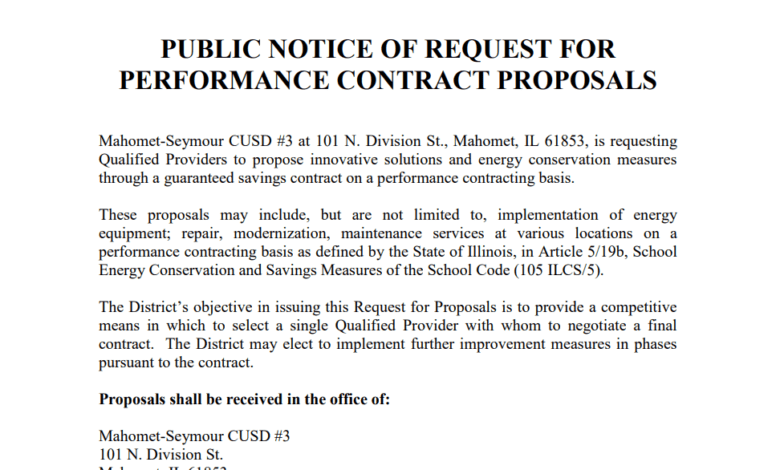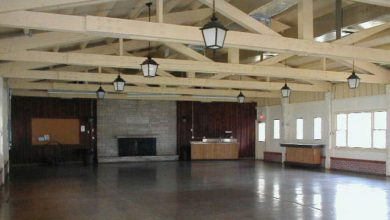Mahomet-Seymour to vote on HVAC performance contract with Ameresco

The Mahomet-Seymour School Board will vote Monday to award Ameresco with $750,000 to put in HVAC controls at Mahomet-Seymour High School.
This will be the sixth amendment to a 2013 performance contract. Ameresco has also been the performance contractor on projects like the press box and chiller at Mahomet-Seymour High School, and bleachers at Mahomet-Seymour Junior High, among others.
Earlier this year, the district allotted $422,000 of ESSER III money to go towards HVAC controls at Mahomet-Seymour High School. The additional dollars will be made up through sales tax that is currently in the Site and Construction Fund, among others.
The HVAC control project is something that was first discussed publicly in 2019.
Information presented to the board on Sept. 12 included several options, including the $750,000 option that will update controls throughout the building instead of targeted areas, but board members Jeremy Henrichs, Colleen Schultz and Meghan Hennesy raised concerns about the lack of detail for that amount of money. They were also concerned that the project was not being bid out to ensure the best price and solution for the district.
Superintendent Kenny Lee noted a performance contract that the board of education entered into with Ameresco in 2013. A Google search for that document showed that in 2012 the district solicited an RFP (request for proposal), for “implementation of energy equipment; repair, modernization, maintenance services at various locations on a performance contracting basis as defined by the State of Illinois, in Article 5/19b, School Energy Conservation and Savings Measures of the School Code (105 ILCS/5).”
The document shows that Ameresco helped prepare the specifications of the request for proposals.
The total amount of savings the district is promised to see isn’t defined at this point. Those details will be presented should the performance contract be awarded to Ameresco. Yet, contracts like this are not unusual, and the district has signed similar contracts with Ameresco before.
Under 105 ILCS 5/Art. 19b, school districts can bypass requirements that contracts be awarded to low bidders when improvements are supposed to cut energy costs in an amount sufficient to pay for the work.
The law says, “The contract shall provide that all payments, except obligations on termination of the contract before its expiration, are to be made over time and that the savings are guaranteed to the extent necessary to pay the costs of the energy conservation measures. Energy saving may include energy reduction and offsetting sources of renewable energy funds including renewable energy credits and carbon credits.”
Through a guaranteed energy savings contract,methods to measure savings to determine how much energy projects have saved need to be specified.
Even after the installation of energy-efficient transformers and lights in the Ball-Chatham School District was complete, community members realized that the district had received no guarantee that savings would pay for the $2.2 mil. work performed by Ameresco. Those community members, who were also former school board members, filed a lawsuit against the Massachusetts-based company that develops renewable energy projects and makes buildings energy efficient for government bodies throughout the United States. Taylorville joined the lawsuit.
The suit claimed that the contract was supposed to guarantee that energy savings would cover the cost of work that included installation of energy-efficient transformers and lights at schools. But an attachment to the contract, which neither the school board nor the district’s lawyer saw before paperwork was signed, negated any guarantee that savings would cover the cost of the work, according to reporting by the Illinois Times.
An attachment to the contract, though, said that all energy savings were stipulated as having been accomplished, as opposed to having been proven through an objective measurement of energy savings.
The board members saw that their former Superintendent had also had dinner with Ameresco prior to the contract approval, and claimed that those discussions led to the performance contract. The claim included that former superintendent worked with Ameresco in some capacity, too.
A community member in the Hillsboro Community School District also filed a lawsuit against their district after a $7 mil. payment to Ameresco for bathroom renovations and roof work in one school. The agreement did guarantee energy and operational savings over a 20-year period, but, according to a Franczek blog post, the Board waived any audit, measurement, or recovery of all but a minor fraction of that savings, and procured no independent evaluation to assess the likelihood of actually realizing the stipulated savings. The taxpayer felt that violated Article 19b of the School Code.
The case was thrown out, though, because the “taxpayer did not file his suit until approximately four years after the Board entered into the original agreement with Ameresco, three years after the bonds to pay for the work were issued, and more than a year after all construction had been completed and all payments made.”
In an interview, Lee said that contract amendments to the original 2013 agreement is what keeps the board informed on the scope of each project.
Hennesy brought up that the board had received emails from other vendors who stated that they could do the work for less than what was quoted by Ameresco. While the name of those vendors were not disclosed, it was stated that the district was not happy with previous work, and that Steve Curtis, Director Of Facilities, is “not a big fan” of that company.
Ameresco, though, would not actually do the work once it is defined. The board should receive additional details Monday morning.
Ameresco would act as the project contractor and hire other companies, perhaps even some who have previously worked on systems at Mahomet-Seymour, to complete each task. As the performance contractor, they would then be responsible for the guarantee on both the energy savings they predict and equipment for the next 20 years. The district would not pay over $750,000 for the project.
Since July 2017 the Mahomet-Seymour School District has spent $841,859.38 on HVAC repair throughout the district. Thumbing through board packets during that time, it is difficult to tell how much of that money went to repairs at Mahomet-Seymour High School, but companies like Davis-Houk, Davis Electric and Alpha Controls come up in the bill list consistently for HVAC repairs. BRiC Partnership, LLC is also listed in the board bill list for “survey and documentation of all building HVAC systems.”
A slew of other businesses are go-tos for the Mahomet-Seymour District. Some of those businesses were pointed out to Lee last week when he was asked if the district had any other contracts like a “performance contract.”
Because those invoices come in at under $25,000, the work does not have to be bid out or approved by the board. Without that process it is unclear how the district chooses the businesses it works with on each project.
This issue has been brought up in prior board meetings and was reiterated last Monday. Schultz said without a competitive bidding process, companies, like Ameresco, can come up with any price they want, and get the contract.
For example, Mahomet Daily reporting showed that Davis-Houk has been paid at least $1,319,715.60 by the district since July 2017 for various maintenance repairs, like HVAC and plumbing. Davis-Houk gave $1,000 to the Bulldog Blueprint PAC in support of the referendum.
This is just one example of vendors who do or could potentially work on a project donating money to a district cause.
Schultz and Hennesy brought up this idea of “quid pro quo” at the Sept. study session.
A 2021 article in the Mahomet Daily showed that Ameresco bought dinner for three board members and district employees at Fogo De Chao during the IASB conference in Chicago in 2021. During that event, the district also had dinners, drinks and hors d’ oeuvres provided by other vendors, such as BLDD, the Architect of Record; Core Construction, who also gave to the Bulldog Blueprint and has made donations to projects within the district; Stifel, an underwriter of K-12 school bonds, including those at Mahomet-Seymour; and Franczek, one of the district’s lawyers. Stifel also donated money to the Mahomet-Seymour Education Foundation at the request of the district and noted within a contract to underwrite the referendum bond.
When asking the district to bid out this project, Schultz asked the board, “How do we decide (who to use)? Whoever takes us out to dinner buys us a $100 steak? That’s the one that we use?”
Lee said that if the board did not feel comfortable with the performance contract avenue, which would not be bid out at this time, the board could choose to bid out the work that needs to be done to bring the high school HVAC system up to current standards, relieving the building of issues, like discrepancies in temperatures from place to place within the building.
Curtis said in going that way, there may be engineering costs that would be on top of the bid. Hennesy said that she believes the contract should include the scope of engineering that needs to be done, along with all of the installation, mechanics, hardware and should include a maintenance agreement with terms throughout the life of the contract.
The district has budgeted $400,000 in HVAC maintenance and repairs throughout the district in the FY 2023 budget. That money will go towards repairs, and is outside of the $750,000 for this project.
Here are the documents the district provided in respects to contracts with Ameresco
Here is how the Mahomet-Seymour School district spent or will spend ESSER money




